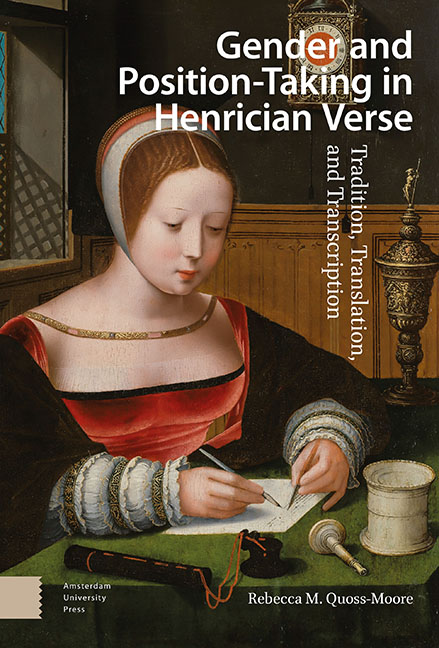Book contents
- Frontmatter
- Table of Contents
- Acknowledgements
- Introduction
- 1 Early Verse Position-Taking in the Henrician Court
- 2 Traditions of Resistance and Verse Position-Taking
- 3 Translation and the Position-Taking Verse Tradition
- 4 Men’s and Women’s Approaches to Translation and Authority in the Late Henrician Court
- 5 Transcription as Translation: Writing the Language of Manuscript Poetry
- 6 Resistance and Unity in the Douglas-Howard Exchange
- Conclusion
- Bibliography
- Index
4 - Men’s and Women’s Approaches to Translation and Authority in the Late Henrician Court
Published online by Cambridge University Press: 13 February 2024
- Frontmatter
- Table of Contents
- Acknowledgements
- Introduction
- 1 Early Verse Position-Taking in the Henrician Court
- 2 Traditions of Resistance and Verse Position-Taking
- 3 Translation and the Position-Taking Verse Tradition
- 4 Men’s and Women’s Approaches to Translation and Authority in the Late Henrician Court
- 5 Transcription as Translation: Writing the Language of Manuscript Poetry
- 6 Resistance and Unity in the Douglas-Howard Exchange
- Conclusion
- Bibliography
- Index
Summary
Abstract: This chapter focuses on translation from classical and ancient sources, engaging Surrey’s Aeneid and Wyatt’s Psalms and considering Katherine Parr’s uses of biblical and political authority. Parr’s work offers a bridge into an examination of the use of translated work from verse into prose by Elizabeth I and Jane Lumley. These works are considered, together, as translations of texts that had already been assigned cultural importance and authority, thus increasing the interpretive cultural framework. This section on translation emphasizes the interpretive frameworks audiences were expected to bring to their reading and offers us practical demonstrations of how power—inflected by gender, status, and age—is played out on the page.
Keywords: Surrey’s Aeneid; Penitential Psalms; Katherine Parr; Elizabeth I’s Miroir; Jane Lumley; Tudor translation
This chapter continues investigation into the functions of translation as a position-taking strategy, but the focus here shifts to translation from classical, ancient, and royally authorized sources, engaging translations like Surrey’s Aeneid and Wyatt’s Penitential Psalms alongside work by Katherine Parr and two prose translations created by young Englishwomen out of foreign language verse: Elizabeth Tudor’s Miroir and Jane Lumley’s Iphigeneia. On one hand, the canonical texts from which Surrey, Wyatt, and Lumley work may offer greater constraints than the Italianate love poetry examined in the previous chapter. These canonical authors had, after all, already famously highlighted particular concerns and themes; while the same can be said of Petrarch, certainly, the weight of the traditions were simply different. These works were often approached as more sacrosanct and less open to entirely new interpretations. This argument was particularly foregrounded in translation of religious texts, and further emphasized by the contemporary controversy on whether vernacular translation of religious texts was even appropriate. On the other hand, though, this offered a cultural store of response which writers might manipulate in particularized ways, either working through their own tensions as mirrored in the classical texts or manipulating their content to match or frustrate perceived desires and expectations. While a similar cultural resource was accessed when writers translated courtly love lyrics, the sheer weight of interpretive tradition associated with Virgil, the Psalms, or Euripides increases the translator’s interaction with, and reaction to, the cultural mythos surrounding each work.
- Type
- Chapter
- Information
- Gender and Position-Taking in Henrician VerseTradition, Translation, and Transcription, pp. 113 - 162Publisher: Amsterdam University PressPrint publication year: 2023



